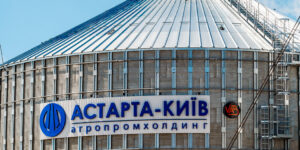
The board of directors of Astarta, Ukraine’s largest sugar producer, has approved a decision to start construction of an oilseeds processing plant, including soybeans and rapeseed, in Khmelnytsky region, in which it will invest $76 million, the company’s press service reports on Facebook.
According to the report, the planned capacity will be 400 thousand tons per year. It is scheduled to be commissioned in 2026.
“Astarta continues to strengthen its position in the processing sector by investing in new production facilities. The growing demand for soybean products in the EU opens up new opportunities, and we are ready to realize them using our experience and expertise.
The new oilseed processing plant will allow us to expand the range of ingredients for the feed base,” said Vyacheslav Chuk, Astarta’s Chief Commercial and Strategic Marketing Officer.
The agroholding noted that the project envisages the efficient use of the existing infrastructure of the agro-industrial holding and will contribute to the development of the agro-industrial ecosystem in the Western region.
“The Astarta team is already actively working on its implementation. Just today we have finalized the agreement with the manufacturer of the extraction equipment and technology. We are waiting for the decision of the Narkevytska territorial community to allocate land for the project. According to our experts, this project meets the requirements of the law “On State Support for Investment Projects with Significant Investments in Ukraine”, so we intend to apply for participation in the program to speed up its implementation,” Chuk added.
“Astarta is a vertically integrated agro-industrial holding company operating in eight regions of Ukraine. It includes six sugar factories, agricultural enterprises with a land bank of 220 thousand hectares and dairy farms with 22 thousand cattle, an oil extraction plant in Globyno (Poltava region), seven elevators and a biogas complex.
In 2023, the agricultural holding reduced its net profit by 5.0% to EUR61.9 million, and its EBITDA decreased by 6.1% to EUR145.77 million, while revenue increased by 21.3% to EUR618.93 million.
“In January-September 2024, Astarta increased its net profit by 35.1% to EUR75.60 million, EBITDA by 12.8% to $131.56 million, with revenue up 12.6% to EUR441.46 million.
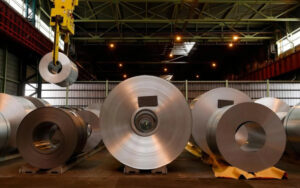
In 2024, Metinvest Mining and Metallurgical Group significantly increased its total exports and sales of iron ore to more than 12 million tons and significantly reduced production costs, Metinvest CEO Yuriy Ryzhenkov said in an interview with Forbes Ukraine.
“We have fully returned to the operational efficiency improvement program. For example, we have reconfigured our business process to use our own raw materials. And by most indicators, I mean technical, technological, and production ones, we have returned to the best results of 2020-2021,” the CEO stated.
According to him, the main disadvantage is the electricity outage and problems with its import. Another problem is the increase in tariffs for the services of natural monopolists, primarily the increase in electricity transportation tariffs and logistics. In addition, the aggressor’s offensive towards Pokrovsk. As a result, the group was forced to suspend the mine’s operations due to the inability to ensure electricity supply and safety factors for employees.
“We were preparing for this and diversified our supply chain for the same coal – we contracted as much as we could from other companies and shipped it for Ukraine’s needs from our plant in the US. We will definitely not stop steel production because of the temporary shutdown of the Pokrovsk mine. But it will have a serious impact on the company’s economy. Instead of supplying coal via the nearest logistics route, from Pokrovsk to Zaporizhzhia and Kamianske, we will now have to buy coal all over the world, and the logistics component will have a significant impact on our production costs. In general, up to 10% of the cost of coal,” said the CEO.
Answering a question about Donald Trump’s economic policy and expectations for the consequences for the global economy, Ryzhenkov explained that “it is not really known which initiatives of Donald Trump are serious and which are working to raise rates or invite to a dialogue.”
“We see tumultuous actions that make waves in the entire global economy, currencies, and so on. How will it all end? When a major power like the United States turns to protectionism, it is a serious problem for the global economy and, by the way, for the United States itself. It’s just that they will feel the consequences later – in three to four years,” the top manager predicts.
In turn, he noted that Metinvest’s deliveries to the US are insignificant – not even within the margin of error: “The largest share is pig iron, which is not subject to duty, and I think this will not change – it is the raw material for the American economy.”
Speaking about staffing issues, the CEO said that more than 20% of the group’s employees, or 30% of those liable for military service, are currently mobilized. Ryzhenkov believes that we need a normal, well-thought-out reservation system that will allow us to work. Reservations are not a privilege for business, as some say, but an integral part of preserving the economic basis of the state’s defense capability. If the economy does not work, Ukraine will lose the war, despite the support of the West.
As for the export strategy, it has not changed much compared to the period before the full-scale war.
“There are our key markets – Ukraine, the EU countries, where we supplied more than 50% of our products before the full-scale invasion. And then there are all the others, the so-called balance markets, which are characterized by a more opportunistic approach to supply. When it’s profitable for us, we go there, and when it’s not profitable, we don’t go there,” the CEO stated.
The Group’s key markets for iron ore are the EU countries. And the company has expanded them, entering Scandinavia and the Nordic countries. What we cannot sell in the EU due to limited consumption volumes is sold to Southeast Asia: China, South Korea, and so on, said the company’s CEO.
“The main thing we have focused on is the production of iron ore with a higher iron content, which is now in demand. We have already mastered its production at our joint venture, Pivdennyi GOK. Before the full-scale invasion, we did it at our Central GOK,” explained the CEO.
Regarding the forecast – what factors will have the greatest impact on exports in 2025 and what are the potential critical risks – Ryzhenkov divides them into several blocks. The first is to maintain the competitiveness of Ukrainian producers in foreign markets. This requires that state-owned monopolies do not create additional tariff pressure on operating businesses.
The second is maintaining access to foreign markets (it is important to preserve the liberalization of steel trade with the EU, the US, and the UK) and strengthening sanctions against the Russian metals and mining industry, which continues to sell slabs and pig iron to the EU because of the position of certain countries.
The third is a consistent environmental and industrial policy of the state on eco-modernization and decarbonization. Ukraine needs a delay in the CBA because of the war. And confirming the criticality of booking and engaging veterans in the workforce will remain a relevant factor because of the risk of losing qualified personnel.
“As for new challenges, it is access to financing for modernization and green transition projects in the mining and metals sector, as well as ensuring stable demand for Ukrainian steel in the domestic market. But these topics are post-war, and we can talk about them separately when peace comes,” the expert believes.
Speaking about the energy independence of Metinvest’s enterprises, the CEO said that the group has its own generation, about 45-50 MW, which provides the most critical processes – about 10% of the company’s energy consumption. Another 40 MW of gas-fired generation is under construction, which will be commissioned in 2025, and solar panels are also being installed.
Regarding investments, the CEO emphasized that due to security risks, the company cannot invest in Ukraine as before. There were serious investment plans in Mariupol, Kryvyi Rih, Zaporizhzhia, and Kamianske. Nevertheless, in 2024, the total investment volume reached about $670 million at the group’s sites in Ukraine. This includes both OPEX and CAPEX. As soon as the company is able to attract financing, there will be plans for large projects.
This year, we also have many plans, for example, a tailings pulp thickening project at Northern GOK and the repair of blast furnace No. 9 at Kametstal are being implemented at our own expense. The volume of investments in these projects in Ukraine alone is about $50 million.
Investment plans abroad include the largest project for the coming years – the construction of a green steel plant in Italy. The estimated cost of the joint project is EUR 2.5 billion.
Among other potential acquisitions, the company is interested in Eastern and Southern Europe – regions where it is possible to create synergies with the group’s existing business processes and Ukrainian assets. The company may take part in a tender for the sale of the Polish plant Huta Chestochowa, which once belonged to the Industrial Union of Donbass.
“In Ukraine, we have a $8 billion strategy for the green modernization of Ukrainian enterprises for 7-10 years. We are ready to launch this strategy as soon as the war is over and Ukraine receives security guarantees,” Ryzhenkov added.
“Metinvest is a vertically integrated group of steel and mining companies. The group’s enterprises are mainly located in Donetsk, Luhansk, Zaporizhzhia and Dnipro regions. The main shareholders of the holding are SCM Group (71.24%) and Smart Holding (23.76%), which jointly manage it.
Metinvest Holding LLC is the management company of Metinvest Group.
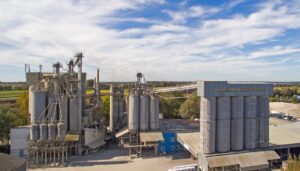
Kreisel, a member of the Fixit Group, has completed the construction of a building materials and systems plant in the village of Pisky (Lviv region), with investments in the project amounting to almost EUR 14 million, the press service of the Lviv Regional State Administration reports.
“First of all, we thank you for supporting our project, as it is of great importance not only for our company but also for Europe. One of our main tasks is to create conditions for the development of the local economy, attract investment and create new jobs,” Michael Kraus, Director of the Eastern Europe region of the Fixit Group, was quoted in the press release.
According to him, the company is currently in the process of commissioning and preparing documents to obtain a certificate of commissioning.
The concern pays special attention to local staffing and training. Thus, specialists were certified and trained to maintain the equipment, which made it possible to ensure commissioning without the involvement of foreign installation teams.
According to the press release, Rava-Rus Lyceum will also become the company’s partner in training professional staff. In addition, it is planned to launch an academy in Lviv region that will specialize in training specialists for the construction industry.
Representatives of Kreisel and the Lviv Regional State Administration also discussed the possibility of setting up wind farms to power socially important facilities.
As reported, construction work at the Kreisel plant in Lviv region began in August 2021.
Founded in 2004, Kreisel Building Materials LLC is a subsidiary of Austrian Roefix AG and is part of the international concern Fixit Gruppe, one of the leading suppliers of building materials. The concern unites five brands: Fixit, Greutol, Hasit, Kreisel and Röfix.
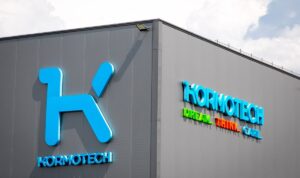
Leading Ukrainian pet food manufacturer Kormotech has started construction of a new plant in Lithuania, in which it will invest EUR60 million, of which EUR40 million is provided by the European Bank for Reconstruction and Development (EBRD), according to Vitaliy Koval, Minister of Agrarian Policy and Food.
“I took part in the ceremony of laying the capsule for the expansion of the Kormotech plant. This is the largest Ukrainian producer of animal feed, which not only conquers the European market but also continues to scale thanks to its powerful entrepreneurial energy. Today, it is important for Ukrainian business to develop its presence in European markets without losing momentum,” he wrote on Telegram.
According to the minister, Kormotech is expanding its existing facilities in Lithuania, where it will create 200 new jobs to complement the team of 170 Ukrainian and Lithuanian specialists and the development of related industries. In addition, the company’s products in this country will have some Ukrainian components.
“One of our priorities in the Ministry of Agrarian Policy is to open new markets and expand existing ones. I am confident that Kormotech’s production facilities will enable other Ukrainian companies to enter the European market or increase their presence there,” Koval said and thanked the Lithuanian partners for supporting Ukrainian entrepreneurs who are becoming part of the European economy.
Kormotech is a global family-owned company with Ukrainian roots that has been producing cat and dog food under the Optimeal, Club 4 Paws, Woof! and Meow! brands since 2003. The company has production facilities in Ukraine and the EU, with a product range of over 650 items. Its focus on exports and geographical diversification helps it withstand the impact of Russia’s war against Ukraine.
In 2023, Kormotech’s turnover increased by 22.5% to $152 million from $124 million in 2022. The ratio of sales abroad and in Ukraine in tons is now 31% to 69%, respectively (in 2022 it was 28% to 72% in Ukraine).
Kormotech brands grew most dynamically in the markets of Romania (+35%), Poland (+11%) and Moldova (+11%).
Kormotech is a leader in Ukraine, one of the world’s top 50 pet food producers and one of the top 21 most dynamic pet food brands. The ultimate beneficiaries of Kormotech are Olena and Rostyslav Vovk.
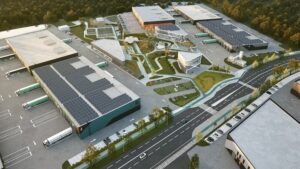
Pozhmashyna Industrial Company (Pryluky, Chernihiv region) has signed an agreement with the Formatsiya.Lviv industrial park to build a new plant, the company reports on its Facebook page.
“The day of January 31, 2025 will go down in the history of not only our company, but also in the history of Ukrainian engineering (…). Realizing all the military and other risks, we are investing $15 million in Ukraine, in the development of the country’s industry, and in job creation,” the statement said.
The construction period is two years.
“Despite everything – a full-scale invasion, all the difficulties and risks, the shameful attitude of the authorities to business that exists today – we, an industrial company, did not run away, did not close production, did not lay off people,” Pozhmashina emphasizes.
As reported, after the outbreak of full-scale hostilities, Pozhmashina partially relocated its production facilities to Lviv.
Pozhmashyna produces a wide range of firefighting, rescue and specialized equipment, and has repeatedly supplied special equipment to the State Emergency Service of Ukraine.
According to the Clarity Project, in 2023, the company increased its net profit by 19.3% year-on-year to UAH 537.7 million, while net revenue increased 2.2 times to UAH 2 billion 093 million. In January-September 2024, net profit decreased by 2.8 times compared to the first nine months of 2023 to UAH 189.3 million, while revenue more than halved to UAH 946.7 million.
Oleg Averyanov is the founder and ultimate beneficiary of Pozhmashina Industrial Company.
Formatsiya.Lviv Industrial Park was included in the register of industrial parks in October 2023. The concept envisages the location of manufacturing enterprises with a total area of over 150 thousand square meters and the creation of 3,600 jobs on an area of over 30 hectares.
The park was created by Alterra Group in cooperation with Lviv City Council, Kyiv School of Economics and the Ministry of Economy of Ukraine.
In December 2024, the park received more than UAH 114 million in funding from the Ministry of Economy under the “Made in Ukraine” program for the construction and development of infrastructure.
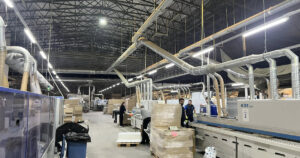
Cabinet furniture manufacturer Accord Import (Khmelnytsky) will almost triple its production capacity by building a new plant in Khmelnytsky, where it plans to create 140 jobs, according to Dmytro Kysylevsky, deputy chairman of the Verkhovna Rada Committee on Economic Development.
“Construction of a new cabinet furniture plant has started in Khmelnytsky. The project’s investor is Accord Import. After the new plant is launched, its production capacity will increase from 420 thousand square meters to 1.2 million square meters of cabinet furniture per month. This will allow the company to enter the top 5 manufacturers of cabinet furniture in Europe,” he wrote on his Facebook page on Tuesday.
According to the MP, the amount of investment in the new project is $14 million. The launch of the first production lines is scheduled for July 2025, and the new plant should reach full capacity in September.
Kisilevsky noted that a 1.1 MW solar power plant has been built and an additional 2.8 MW is under construction to meet the electricity needs, and a gas piston plant has been purchased.
“Currently, the existing Accord Import facility is 100% utilized. About 70% of the company’s orders for cabinet furniture come from the international retail chain JYSK, which in 2025 increased the volume of orders for cabinet furniture from Ukraine by a third,” Kysylevsky wrote.
According to the company’s Facebook page, Raiffeisen Bank has extended the term of the credit line under this contract, which was granted at the end of 2023, and the term of the ECA insurance contract for Accord Import.
“Thus, Raif and ECA have supported furniture exports for 2025 to Denmark, the Netherlands, Hungary, Bulgaria, Poland, Sweden, Germany and Spain,” the company wrote.
According to Kysylevsky, Accord Import exports 96% of its products to the EU, and the launch of the new plant will expand the geography of exports to the Middle East, South Asia, and South America.
The MP also clarified that the owners of Accord Import, the Grabar family, started out as furniture importers, while now it is Ukraine’s largest exporter of cabinetry.
He also added that to replace the imports of cellular cardboard used by the company for furniture packaging, another company is currently under construction in Khmelnytsky Oblast to produce this product.
“And the supplier of wooden boards for Accrod Import is Kronospan, which has recently launched a production line in Rivne region,” Kysylevsky added.
According to the Clarirty Project, Accord Import LLC was registered in Khmelnytskyi in August 2015. The company’s authorized capital is UAH 42.105 million, and the owners are Mykola, Ruslan, and Vadym Hrabar in equal shares.
In January-September 2024, the company increased its net profit by 23% compared to the same period in 2023 to UAH 120.6 million, with net revenue growing by 27% to UAH 1 billion 271 million.